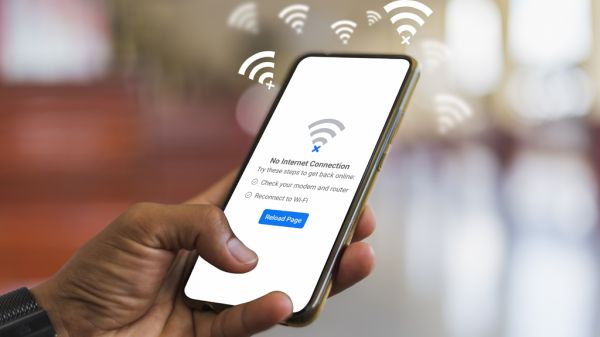Life Without Internet: Social Media, E-banking, Ride Hailing Services Disrupted | Features
[ad_1]
What started as a mere internet interruption has turned out to be a full-scale crisis that has implications for financial transactions and even national security, with the full impact of the situation still being analysed.
With internet data services hampered by the reported tampering of multiple undersea cables in Portugal, Senegal and Cote d’Ivoire, the consequences appear more dire than earlier perceived.
Worst still, the crisis, which reportedly resulted from the disruption in the West Africa Cable System (WACS) and other cables continues, to affect the delivery of essential services across sectors, with many individuals and institutions suffering commercial losses.
Technical sources have suggested that even as the various network service providers continue to work to improve services to custoers, a complete recovery could take weeks.
Specifics about the situation, they said, were currently unknown but industry experts suspect undersea earthquake.
While banking services, for instance, were disrupted by the collapse of internet service on some networks, ride hailing services that rely on data service were equally impacted, grounding many vehicles throughout Thursday and yesterday.
Academic work in the country’s tertiary institutions are equally feeling the pinch of the Internet crisis as lecturers and students struggle to download articles for research purposes.
Providing updates on the disruptions in the Internet, the National Communication Authority (NCA) said the current disruption had been occasioned by some impact on four international undersea cables, namely ACE, the West Africa Cable System (WACS), SAT-3 and MainOne.
The NCA added that after contacting submarine cable service providers and mobile network operators (MNO), it came to light that the disruptions, which affected international traffic into the country, occurred in multiple places, including Cote d’Ivoire and Portugal.
“As a result of the multiple undersea cable cuts, Ghana lost 1,596.6 Gbps data capacity,” the NCA stated.
Ghana’s biggest internet service providers, MTN and Telecel (formerly Vodafone), are both on the affected cables, leaving only Airtel-Tigo, which is hooked on the Glo1 cable with uninterupted service, while the other telcos work to restore full service.
As of yesterday, Facebook, Google and some other social media services were working on the MTN network because of the caching solutions installed in Ghana which pick updates from the data centres in Nigeria.
Sources further told the Daily Graphic that both MTN and Telecel were making efforts to connect to the Google Equiano cable which terminates in Togo to improve internet connectivity.
To understand the steps the government is taking to address the challenge, the Minister of Communication and Digitalisation, Ursula Owusu-Ekuful, is expected to appear before Parliament on Monday to answer questions.
Security implications
Amid the uncertainty brought upon a part of the world by the truncation of internet service, a security expert, Col. Festus Aboagye (retd), told the Daily Graphic that it was a wake-up call on the relevant agencies to find a backup that would not leave the nation’s fate in the hands of external enterprises.
He said although the security implications of the internet blackout could be dire for the country, it was also an opportunity for the country to build robust systems that can serve as a backup.
Speaking to the Daily Graphic yesterday, the retired military capo called for a comprehensive assessment of the situation to inform policy intervention for the future.
He stressed the need for the NCA to work with other critical institutions such as banks, the Ghana Meteorological Agency (GMet) and the Ghana Police Service to get a clear picture about the information and security implications of the blackout to help deal with future occurrences.
Col. Aboagye added that the internet blackout had security implications for the country because it affected the state’s capacity to use the communication infrastructure to deliver services to the people and protect the livelihoods of citizens.
He also observed that citizens, whose businesses depended heavily on the Internet and other digital platforms, suffered commercial losses that could also have security implications.
For instance, he said, the disruption in Internet definitely affected the delivery of healthcare services at hospitals, which put people’s lives on the line.
The security expert also said the breakdown of the Internet meant that personnel of the Ghana Immigration Service struggled to process the information of immigrants and that could compromise the country’s security.
He added that the current Internet blues could affect the timely release of relevant security information by GMet and the Ghana Police Service.
“The information GMet has for forecasting the weather is used by many other agencies, especially those in the maritime sector. The maritime agencies need the information from GMet to contact vessels on the sea to warn them about weather situations and disasters at any point in time; but with the disruption of the means of communication, this poses risks,” he added.
Wake-up call
Col. Aboagye stressed that the useful lessons to learn from the current situation was that going digital did not mean we should not have alternate sources of connectivity aside from the submarine cable.
Particularly, he stressed that even as the Electoral Commission (EC) continued to implement innovative policies to improve on the electoral process, the Internet blackout had shown that it was not safe to discard the other systems that had existed for some time now.
“What comes readily to mind during this Internet blackout is that if it had happened on the day of election, what would have been the fate of the EC and the country? Supposing the digital verification system breaks down on December 7, 2024, how will the EC have managed the situation, if there is no manual verification system?” he further quizzed.
Col. Aboagye said it was good that the EC had rescinded its decision to do away with indelible ink as part of the voting process because this Internet disruption supports maintaining the indelible ink.
Source: Timothy Ngnenbe
| Disclaimer: Opinions expressed here are those of the writers and do not reflect those of Peacefmonline.com. Peacefmonline.com accepts no responsibility legal or otherwise for their accuracy of content. Please report any inappropriate content to us, and we will evaluate it as a matter of priority. |
Featured Video
[ad_2]
Source link













Leave a Reply